| Srl | Item |
| 1 |
ID:
132034
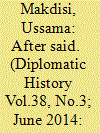

|
|
|
|
|
| Publication |
2014.
|
| Summary/Abstract |
The question of how to represent the U.S. role in the Middle East brings to the fore the question that Edward Said first raised in 1978 in Orientalism about the nature of American understandings of the Middle East. More than three decades after the publication of his book, Said's criticism of Orientalist scholarship-and his accompanying plea for a secular humanistic interpretation to replace it-remain both topical and enigmatic. It is one thing to criticize American representations of foreign cultures; it is an entirely different matter to study American engagements with them. These are by no means unrelated endeavors, but by the same token, they entail very different conceptions of what constitutes a field of inquiry and how to go about studying it comprehensively. The recent emergence of a more critical scholarship of America and the Middle East, therefore, begs the question of whether it is possible to write a history that takes both the Americans and Arabs equally seriously despite the prevailing political climate, and ultimately what kind of methodology this might entail for the rewriting of U.S.-Arab relations, and more broadly, American involvement in the world.
|
|
|
|
|
|
|
|
|
|
|
|
|
|
|
|
| 2 |
ID:
085402
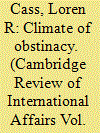

|
|
|
|
|
| Publication |
2008.
|
| Summary/Abstract |
Despite sharing a large number of attributes, Canada and Australia's foreign policy positions in international climate negotiations have varied significantly. Given the similarities in variables affecting climate policy, how do we explain the variation in foreign policy responses to climate change between the two countries? Rational choice and domestic political analyses have failed to fully explain the observed variation. National responses to climate change in Australia and Canada appear to be significantly shaped by ideational forces as well. In particular, political leaders have pursued symbolic climate policies to cultivate national identities for two distinct audiences-international partners and domestic voters. International climate policy positions have been frequently used as communication tools by both states with the resulting climate positions bearing little relationship to each government's domestic climate policies. The Australian and Canadian cases raise important questions regarding the relationship between foreign policy commitments and related domestic policy reforms, which have substantial implications for the effectiveness of global efforts to address climate change.
|
|
|
|
|
|
|
|
|
|
|
|
|
|
|
|
| 3 |
ID:
085409
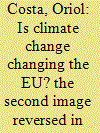

|
|
|
|
|
| Publication |
2008.
|
| Summary/Abstract |
The participation of the European Union (EU) in the international negotiations on climate change has attracted a significant share of scholarly attention. Climate change has certainly become a new dimension of European foreign policy and has enabled the EU to play a leadership role in the international arena. However, the relationship between the EU and the international climate regime is not a one-way street-while the EU has been active and decisive in shaping international negotiations, the latter have also had an impact on the EU. The international negotiations have influenced the EU's decision-making processes and internal negotiations-which has in turn influenced European integration itself. This article builds on the arguments of second image reversed analyses and proposes that there is a reciprocal relation between certain conditions of the EU-domestic setting and the international climate regime. The internal arrangements of the EU regarding climate change have maximized the influence of the regime and the very existence of the international negotiations has moulded these arrangements, making them more prone to external influence.
|
|
|
|
|
|
|
|
|
|
|
|
|
|
|
|
| 4 |
ID:
091983
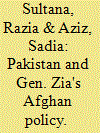

|
|
|
|
|
| Publication |
2009.
|
| Summary/Abstract |
The Soviet invasion of Afghanistan in December 1979 suddenly changed the geo-strategic environment of the region. Overnight Pakistan became the front-line state against the Soviet occupation as well as the principal channel through which military assistance was provided to the Afghan mujahideen(holy warriors).
|
|
|
|
|
|
|
|
|
|
|
|
|
|
|
|
| 5 |
ID:
085423
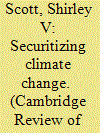

|
|
|
|
|
| Publication |
2008.
|
| Summary/Abstract |
On 17 April 2007 the United Nations Security Council held its first debate on climate change, energy and security. Since then, and despite a number of reports emphasizing the security implications of climate change, there has, at least in diplomatic circles, been a move away from the previous trend towards accepting climate change as a question of international security. This is primarily due to the possibility of the Security Council taking the lead in coordinating global efforts to mitigate, or adapt to, climate change. Developing countries interpret this possibility as a rejection of the principle of common but differentiated responsibilities as incorporated into the United Nations Framework Convention on Climate Change. The increasing urgency of taking decisive action means that it is too early to rule out a role for the Council with its coercive powers. Ultimately, however, the success of any international regulations will depend on their political legitimacy.
|
|
|
|
|
|
|
|
|
|
|
|
|
|
|
|